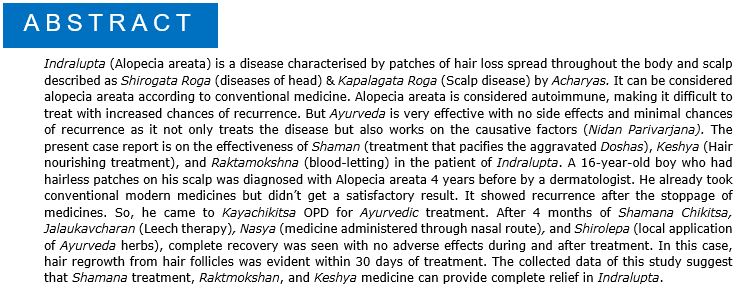Ayurvedic approach for managing Indralupta (Alopecia Areata): A Case Study
DOI:
https://doi.org/10.21760/jaims.8.11.40Keywords:
Indralupta, alopecia, Alopecia areata, Hair loss, Case studyAbstract
Indralupta (Alopecia areata) is a disease characterised by patches of hair loss spread throughout the body and scalp described as Shirogata Roga (diseases of head) & Kapalagata Roga (Scalp disease) by Acharyas. It can be considered alopecia areata according to conventional medicine. Alopecia areata is considered autoimmune, making it difficult to treat with increased chances of recurrence. But Ayurveda is very effective with no side effects and minimal chances of recurrence as it not only treats the disease but also works on the causative factors (Nidan Parivarjana). The present case report is on the effectiveness of Shaman (treatment that pacifies the aggravated Doshas), Keshya (Hair nourishing treatment), and Raktamokshna (blood-letting) in the patient of Indralupta. A 16-year-old boy who had hairless patches on his scalp was diagnosed with Alopecia areata 4 years before by a dermatologist. He already took conventional modern medicines but didn’t get a satisfactory result. It showed recurrence after the stoppage of medicines. So, he came to Kayachikitsa OPD for Ayurvedic treatment. After 4 months of Shamana Chikitsa, Jalaukavcharan (Leech therapy), Nasya (medicine administered through nasal route), and Shirolepa (local application of Ayurveda herbs), complete recovery was seen with no adverse effects during and after treatment. In this case, hair regrowth from hair follicles was evident within 30 days of treatment. The collected data of this study suggest that Shamana treatment, Raktmokshan, and Keshya medicine can provide complete relief in Indralupta.
Downloads
References
Thomas EA, Kadyan RS. Alopecia areata and autoimmunity: a clinical study. Indian J Dermatol. 2008;53(2):70-4. DOI: 10.4103/0019-5154.41650. PMID: 19881991; PMCID: PMC2763714.
Waljee AK, Rogers MAM, Lin P, Singal AG, Stein JD, Marks RM, et al. Short term use of oral corticosteroids and related harms among adults in the United States: population-based cohort study. BMJ. 2017;357:j1415. DOI: 10.1136/bmj.j1415.
Strazzulla LC, Wang EHC, Avila L, Lo Sicco K, Brinster N, Christiano AM, Shapiro J. Alopecia areata: An appraisal of new treatment approaches and overview of current therapies. J Am Acad Dermatol. 2018 Jan;78(1):15-24. DOI: 10.1016/j.jaad.2017.04.1142. PMID: 29241773.
Alsantali A. Alopecia areata: a new treatment plan. Clin Cosmet Invest Dermatol. 2011;4:107-15. DOI: 10.2147/CCID.S22767.
Sushruta. Susruta Samhita with the Nibandhasangraha commentary of Sri Dalhanacharya. Nidansthan Adhyaya 13/3; 2023 edition, Chaukhamba Surbharati Prakashan, Varanasi. 2023;318.
Astangahrdaya of Vagbhata with the commentaries sarvangasundara of Arundatta & Ayurvedrasayana of Hemadri, uttarsthana, Adhyaya 23/24; 2020 edition; Chaukhamba Surbharati Prakashan, Varanasi; 2020;859.
Singhal P, Vyas V, Chhayani P, Patel M, Gupta SN. Ayurvedic management of alopecia areata: A case report. J Ayurveda Integr Med. 2022 Jul-Sep;13(3):100604. DOI: 10.1016/j.jaim.2022.100604. Epub 2022 Jul 19. PMID: 35868136; PMCID: PMC9307686.
Susrutasamhita of Susruta with the Nibandhasangraha commentary of Sri Dalhanacharya. Chikitsasthan Adhyaya 20/24-26; 2023 edition, Chaukhamba Surbharati Prakashan, Varanasi. 2023;479.
Chakrapanidatta, commentator Charaka samhita, Chikitsa sthana, Adhyaya 26/132-133, 3rd ed. Varanasi: Chaukambha Krushnadas Academy; 2020.p.606
Mahajon B, Pal S, Aku R. Arogyavardhini Vati: A theoretical analysis. J Sci Innov Res. 2016;5. DOI: 10.31254/jsir.2016.5605.
Gawas CP, Pathrikar A, Paradkar H, Kamat N. Management of Charakokta stravi vicharchika (Contact dermatitis) through Ayurveda Medicines: A Case Study. Int J AYUSH CaRe. 2023;7(3):244-248.
Shrigod AR et al. Ayurvedic management for Indralupta: A case report. Int J Emerging Technol Innov Res. 2022;9(7):ppe386-e391. Available at: http://www.jetir.org/papers/JETIR2207450.pdf.
Susruta Samhita of Susruta with the Nibandhasangraha commentary of Sri Dalhanacharya. Sutrasthan Adhyaya 15/18; 2023 edition, Chaukhamba Surbharati Prakashan, Varanasi. 2023;71.
Sarngadhara Samhita of Dr. Brahmanand Tripathi; Purvakhanda, Adhyay 5; 2017 Edition; Chaukhamba Surbharati Prakashan, Varanasi. 2017;41-42.
Khemraj Shrikrishnadass Prakashan. Bhavprakash Samhita of Shree Lalashaligram Vaishya krut hindi tika sahit evam Pandit Kantinarayan Mishra; Prakaran 5 Haritakyadi varga; 2010;163.
Tiampasook P, Chaiyasut C, Sundaram Sivamaruthi B, Timudom T, Nacapunchai D. Effect of Phyllanthus emblica Linn. on Tensile Strength of Virgin and Bleached Hairs. Appl Sci. 2020;10(18):6305. DOI: 10.3390/app10186305.
The Ayurvedic Formulary of India. Ministry of Health and Family Welfare, Govt. of India. 2000; I (20:4):664-5.
Charaka samhita, Sutrasthana, Adhyaya 5/59; 3rd ed. Varanasi: Chaukambha Krushnadas Academy; 2020;51.















